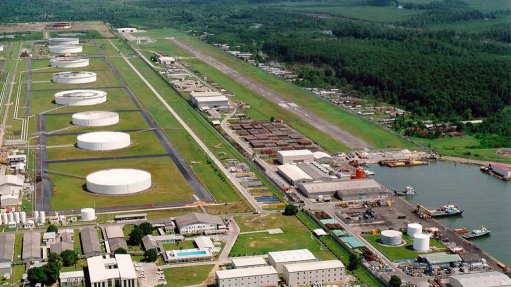
ESCRAVOS GAS-TO-LIQUIDS PROJECT In June the plant, which Sasol has a 10% share in, achieved first production
Photo by: Chevron Nigeria
Over the past three years, South African energy and chemicals group Sasol has placed significant focus on developing gas-based opportunities in Africa, which included the $9.5-billion Escravos gas-to- liquids (GTL) project, in Nigeria, said president and CEO David Constable.
Speaking during Sasol’s financial results announcement, at the company’s head offices in Rosebank, Johannesburg, last month, he noted that the repositioning was part of Sasol’s drive to capitalise on Africa’s burgeoning natural gas industry.
The GTL plant, near the Niger Delta, about 100 km south-east of Lagos, finally achieved first production in June after a nine-year delay. The plant is operated by energy corporation Chevron Nigeria, in which Sasol has a 10% share.
Sasol’s audited financial results report, entitled ‘A New Era For Sasol’, for the year ended June 30, which was released last month, states that start-up activities have continued as scheduled and the facility “will be ramped up to full capacity by the end of the 2014 calendar year”.
The Escravos project was developed by Chevron Nigeria, which owns 75%, the State-owned Nigerian National Petroleum Corporation, which owns 15%, and Sasol.
Sasol’s contribution included plant risk finance for 50% of Chevron’s GTL project cost and providing finance for the Fischer-Tropsch technology and catalyst technology, with financial returns tied to future plant performance.
The Escravos project, which can produce 33 000 bbl/d, is designed to process 325-million cubic feet a day of natural gas from the Escravos gas plant.
Chevron Nigeria also plans to expand the plant’s capacity to 120 000 bbl/d within the next ten years.
The Escravos GTL project will produce diesel, kerosene, naphtha (a volatile aromatic liquid that is similar to petrol) and liquefied petroleum gas – with the diesel and kerosene providing Nigeria with transportation fuels, such as diesel for road vehicles and kerosene to produce jet fuel for aviation.
Meanwhile, Sasol notes that the Escravos GTL plant was originally developed to reduce flaring; however, it is designed to turn what was historically a waste product in Nigeria into high-value products, with the potential to access global export markets.
“The Escravos GTL project has proved that Sasol’s GTL technology can be deployed in even the most challenging of locations,” according to Sasol’s website.